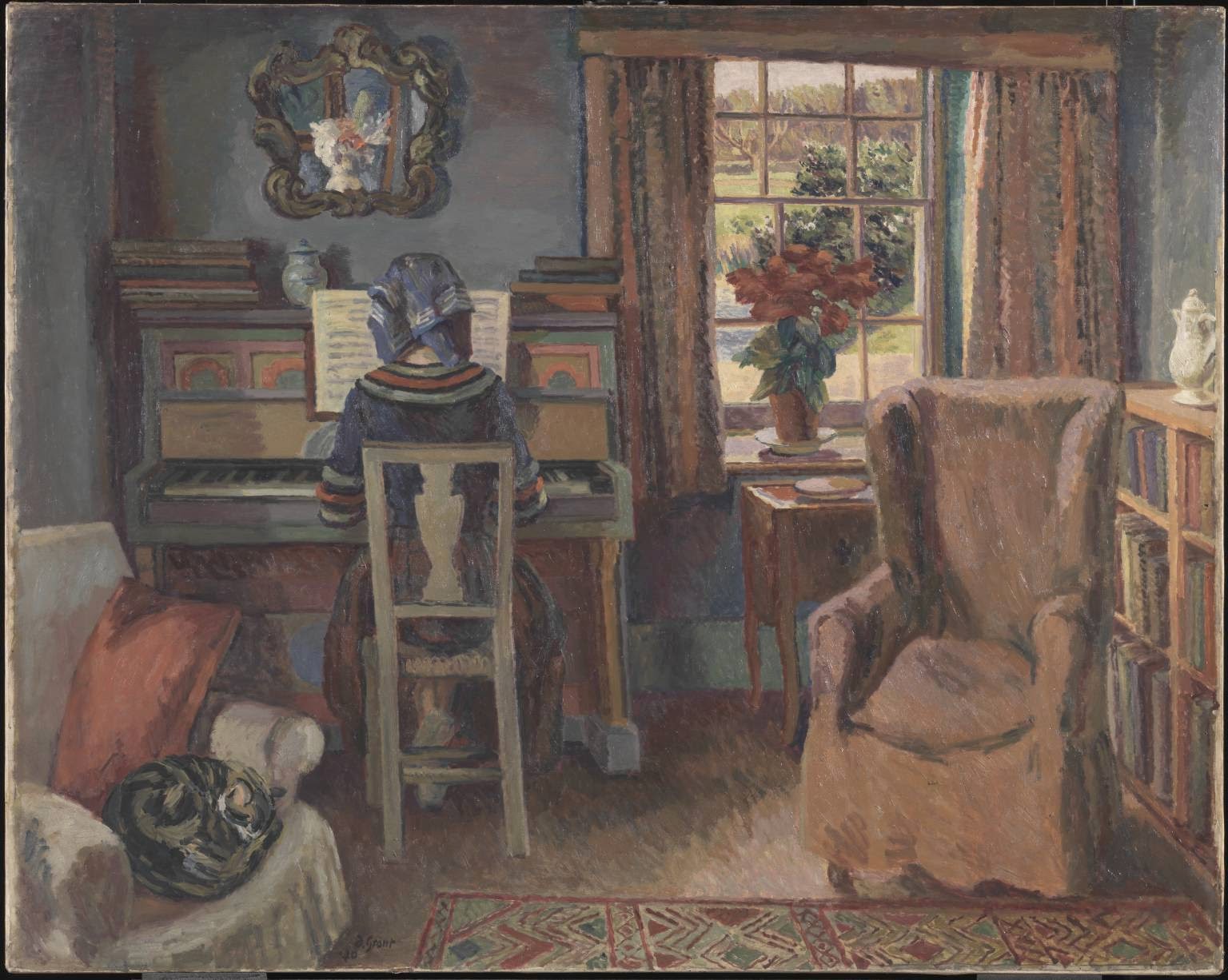Thus, it is not an either/or matter for me. I am unashamedly sentimental about the dogs and cats I have known. Anthropomorphism bothers me not when it comes to these wonderful beings. And I am perplexed by, and wary of, anyone who expresses indifference to them.
As W. H. Auden suggests, each occupies a distinctive place in our lives.
Dog The single creature leads a partial life,
Man by his mind, and by his nose the hound;
He needs the deep emotions I can give,
I scent in him a vaster hunting ground.
Cats Like calls to like, to share is to relieve
And sympathy the root bears love the flower;
He feels in us, and we in him perceive
A common passion for the lonely hour.
Cats We move in our apartness and our pride
About the decent dwellings he has made:
Dog In all his walks I follow at his side,
His faithful servant and his loving shade.
W. H. Auden, Poem V in "Ten Songs," Collected Poems (Random House 1976). The poem is untitled. It was written in 1939.
Duncan Grant, "Girl at the Piano" (1940)
The contemplative detachment of cats is one of their attractive characteristics. Again, whether this is feigned or not, I am not able to say. While dogs are certainly capable of contemplation, detachment is not one of their strong suits.
Imagine the word "dog" substituted for "cat" in the following haiku. It just doesn't feel right.
The peony;
A silver cat;
A golden butterfly.
Buson (1716-1784) (translated by R. H. Blyth), in R. H. Blyth, Haiku, Volume 3: Summer-Autumn (Hokuseido Press 1952), page 295.
Likewise, a dog wouldn't fit in a tableau such as this.
The Cat and the Sea
It is a matter of a black cat
On a bare cliff top in March
Whose eyes anticipate
The gorse petals;
The formal equation of
A domestic purr
With the cold interiors
Of the sea's mirror.
R. S. Thomas, Poetry for Supper (Rupert Hart-Davis 1958).
Philip Connard (1875-1958), "Jane, Evelyn, James and Helen" (1913)
There comes a time in each of our lives when we turn to our faithful companion, feline or canine, and say something along the lines of: "Well, at least you love me." Or: "Well, at least you understand me." And your companion will look directly into your eyes and say, wordlessly: "Of course I do."
The Cat Says --
The Cat says,
And so say I,
Love is a winter fire,
And a summer lawn.
Love is a sharp claw,
Love is a pricked ear,
Love is a strong wind blowing at night
And a light sleep without fear.
I say,
And the Cat says too,
Love is a warm plumage
And a scented wine.
Love is a mackerel sky,
Love is the moon in a well,
Love is a feather the midnight owl lets fall,
And all oceans in a shell.
Sylvia Townsend Warner, New Collected Poems (edited by Claire Harman) (Fyfield Books/Carcanet 2008).
Some among us may find this sort of thing preposterous, sentimental, childlike. Not I. I suppose one's views depend upon how many dogs and cats one has been acquainted with. I'm reminded of something that Arthur Symons wrote about his dog Api: "It is enough to say that the eyes would be human, if human beings could concentrate so much of themselves into their eyes."
John Aldridge (1905-1983), "Lady with Cat"
This last part is difficult, for the memories of past companions come rushing. "At first we seek to forget sorrow, to drown it in noise or oblivion; but gradually it comes back and takes hold of us and becomes our guest. Unbidden, we accept it, and recollection sits down with it by our hearth, an old friend." Arthur Symons, "For Api," Collected Works, Poems: Volume Three (1924).
Yes, so one hopes, but still . . .
Parting from a Cat
Whoever says farewell,
Has, for acquaintance, Death:
Small death, maybe, but still
Of all things dreaded most.
Yesterday I lost
An old, exacting friend
Who for ten years had haunted
My labours like a ghost,
Making my days enchanted
With feline airs and fancies.
Time, no doubt, will send
Some solace; and I know
Memory enhances
The half-companionship
Which is the most that can
Exist between cat and man.
But even so, I mourn
With a miniature grief
That won't relax its grip
Whichever way I turn,
Seeking to forget
My unimportant pet,
And that all life is brief.
Richard Church, The Inheritors: Poems 1948-1955 (Heinemann 1957).
Edward Bawden, "Roses and Rue" (1986)















